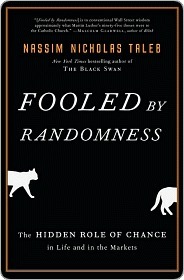More on this book
Community
Kindle Notes & Highlights
Read between
June 8 - June 16, 2021
Intellectual contempt does not control personal envy.
he is extremely rich on the average of lives he could have led—he takes so little risk in his trading career that there could have been very few disastrous outcomes.
That is, his life in stability would be similar to that of an ecclesiastic clock repairman.
The idea of taking into account both the observed and unobserved possible outcomes sounds like lunacy. For most people, probability is about what may happen in the future, not events in the observed past; an
related to a problem called denigration of history, as gamblers, investors, and decision-makers feel that the sorts of things that happen to others would not necessarily happen to them.
For starters, we are not wired in a way to understand probability, a point that we will examine backward and forward in this book.
It is a fact that our brain tends to go for superficial clues when it comes to risk and probability, these clues being largely determined by what emotions they elicit or the ease with which they come to mind.
risk detection and risk avoidance are not mediated in the “thinking” part of the brain but largely in the emotional one (the “risk as feelings” theory).
there are places in our universe where time does not exist.
Mathematics is principally a tool to meditate, rather than to compute.
the sort of intuitions that amateurs build away from the overly detailed sophistication of the professional researcher.
He was shocked that the traders did not do more of the winners and less of the losers.
Psychologists call this overestimation of what one knew at the time of the event due to subsequent information the hindsight bias,
Mathematically, progress means that some new information is better than past information, not that the average of new information will supplant past information, which means that it is optimal for someone, when in doubt, to systematically reject the new idea, information, or method.
it will be unclear who is actually the fittest, and those who will survive are not necessarily those who appear to be the fittest.
Over one month, we observe roughly 2.32 parts noise for every one part performance. Over one hour, 30 parts noise for every one part performance, and over one second, 1,796 parts noise for every one part performance.
(some psychologists estimate the negative effect for an average loss to be up to 2.5 the magnitude of a positive one);
Consider that they are mediated in different parts of the brain—and that the degree of rationality in decisions made subsequent to a gain is extremely different from the one after a loss.
the firehouse effect. He had observed that firemen with much downtime who talk to each other for too long come to agree on many things that an outside, impartial observer would find ludicrous (they develop political ideas that are very similar). Psychologists
This category includes the “chief strategists” of major investment banks the public can see on TV, who are nothing better than entertainers.
The best description of my lifelong business in the market is “skewed bets,” that is, I try to benefit from rare events, events that do not tend to repeat themselves frequently, but, accordingly, present a large payoff when they occur.
I try to make money infrequently,
to go to the palazzo rather than the poorhouse.
Even then, I do not like the asphyxiating structure of competitive games and the diminishing aspect of deriving pride from a numerical performance.
also learned to stay away from people of a competitive nature, as they have a tendency to commoditize and reduce the world to categories, like how many papers they publish in a given year, or how they rank in the league tables.
how I discovered Karl Popper via another trader, perhaps the only one I have ever truly respected. I
read. A book can make a strong impression, but such an impression tends to wane after some newer impression replaces it in my brain (a new book). I
who like me is ashamed of being a trader and prefers his trading to be a minor extension of his intellectual life
I am generally repelled by the wealthy,
He refused to blindly accept the notion that knowledge can always increase with incremental information—which is the foundation of statistical inference. It may in some instances, but we do not know which ones.
movement called positivism pioneered in France in the nineteenth century by Auguste Comte, where positivism meant scientification of things (literally everything under the sun). It was the equivalent of bringing the industrial revolution into the soft sciences. Without


